Life at a Japanese Spa Ikao
Japan, Augst.20, 1886
Competition, allied with steam and steel, is fast operating to lessen the enormous distance which separates Japan from Europe.
Already, with ordinary luck, the traveller who does not tarry may reach Tokio from London via North America in 30 days.
Soon he will be able to do so in 24 or 26 days, by way of Montreal, and Port Moody.
Hitherto, the wonders and beauties of this pleasant land have been virtually monopolized, as far as foreigners are concerned, by a thin stream of travellers, mainly of the "globe-trotting" class.
But the day cannot be far off when they will be brought fairly within the reach of any vacation tourist able to spare three or four months for exploring a country that offers attractions of the highest order as a holiday resort.
Japan, indeed, has the enviable reputation of inspiring love at first sight in the heart of every comer.
Nor is this a mere passing sentiment.
It grows steadily as acquaintance ripens.
As well with those who remain for years as with those whose stay lasts but for a month or so, there is a something about the country and its people that never fails to win lasting and even affectionate regard.

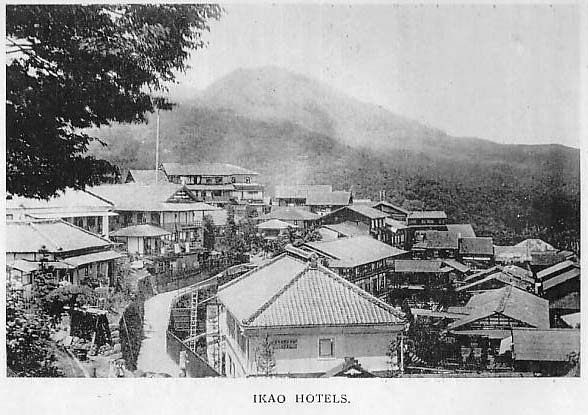
Much has been written, in many books, concerning the characteristics of Japanese cities and life therein.
Every one has read over and over again about the parks, gardens, and fortresses; the tea-houses and hotels ; the jinrikisha-riding and river excursions; the sights and sounds of the streets; tempting curio-shops, with their wealth of art-products; the theatres, conjurers, tumblers, and wrestlers; the temples, all-glorious without and unspeakably glorious within; the national fesivals and fairs; the dainty and exquisitely dressed little geisha who minister at dinners and suppers a la Japonaise; and the many other items which enter into the round of existence in Japan's capital and provincial towns.
We have also heard a good deal of the ordinary features of travel along the main highways, and even along some of the "unbeaten tracks".
But very little has yet been told about those delightful spas and highland health-resorts, long and well beloved by the Japanese, which are yearly becoming better known and better liked by foreign residents and travellers.
The greater part of Japan's territory is essentially volcanic.
Professor Milne counts up 129 mountains scattered over the empire, which are distinctly of volcanic origin, and 51 of which are still active and giving off steam.
The same indefatigable authority has lately collected and published the records of as many as 233 eruptions.
It is no wonder, then, that hot springs abound in several parts of the country.
Some are found in the lowlands.
But by far the greater number are in the mountains and hills.
Now, as opium to a Chinese, or mint-juleps to a Virginian, so is hot-water bathing to a Japanese.
The luxury of the daily hot bath is, indeed, almost as necessary to him as his dinner.
And when the hot water is of Nature's heating, when it rises ceaselessly and in goodly volume from the depths of the earth, in some cool, elevated region blessed with salubrious air and attractive scenery, and when, especially, it possesses valuable medicinal or healing properties-then you have the ideal conditions of a Japanese summer watering place.
To such spots-and there are many of them - the better classes of Japanese swarm at this season, glad to escape from the trammels of town life, from the blazing heat of the plains, and from cities which, alas! are nowadays only too often ravaged by cholera in its direst form.
Notable among these spots is Ikao.
Any one in search of the novel and picturesque, of quiet seclusion from the world's worry and unrest, and of an almost Arcadian existence in a soft, balmy climate and amid enchanting scenery, would be very queerly constituted if he failed to find contentment at Ikao.
Up in the highlands of the province of Joshu, a small, compact assemblage of long, low-roofed Japanese buildings, wide-eaved and wide-verandahed, clings to the abrupt face of a lovely nook in the north-east escarpment of the Haruna mountain group.
A narrow picturesque street, or rather flight of rude steps, to be likened only for steepness to the most breakneck alleys of Malta or Hongkong, climbs directly up the acclivity, and ends at an unpretending temple dedicated to the Shinto god Onamujino-Mikoto.
Provision and sweetmeat shops, tea-houses, public baths, and stalls for the sale of local curios line the little thoroughfare.
At each stage of the ascent lanes lead off right and left to the dozen or two of large two-storied hotels which form the main feature of the place.
These, built on artificial terraces, rise tier upon tier so quickly that the roof of one is barely higher than the ground floor of the next above it.
Thus, from its upper story always, and often from its lower, each commands a goodly view of the fair landscape that is spread below.
Behind rise bold, rounded masses of mountains, covered to their summits with the richest verdure.
Far beneath on the right, in the depths of a precipitous and beautiful ravine, a noisy torrent, foaming over a rust-colored bed, carries down to the plain the waters of the mineral spring which first sees the light a little behind and above the village.
This - a mere handful of a place, yet capable at a pinch of accommodating between 2,000 and 3,000 guests in its short summer season - is Ikao, now fast becoming one of the most polular spas in Japan.
Until recently Ikao was but little known, and frequently only by the holiday folk of the neighbouring region.
But the virtues of its water, both for drinking and bathing, and the advantages of its situation, were brought into prominent notice a few years ago by the distinguished German physician, Dr. E. Baelz, who fills the Chair of Medicine in the University of Japan; and, as three-fourths of the 70 miles which separate it from Tokio can now be traverse by rail, the whole journey thence is easily compassed in a day.
To the hot-water loving and Nature-loving denizens of the vast capital a chance like this was welcome as showers in spring.
Here the town-wearied official or citizen can taste for a while the sweets of the old easy-going life which preceded foreign intercourse, and which in the busier haunts is now slipping out of sight with dreamlike rapidity.
Here, during the lazy warmth of the summer days, he can lounge through existence in all the happy luxury of airy rooms 2,700 feet above the sea, and yet airier costume, oft-repeated bathing and water-drinking, a good deal of eating and sleeping, and entire freedom from work, worry, and mosquitoes - and all this in a lovely retreat which still retains its old simplicity, with scarce a symptom of modern improvement.
He can walk or romp with his children, gossip with his friends, and play "go" or Chinese chess with them to his heart's content.
He can drink innumerable little cups of tea and sake, smoke untold pipes( three or four whiffs a piece) of the mildest of tobacco, and, if it please him, beguile the time with musical and dancing entertainments by infant prodigies, middle-aged experts whose only charm is in their skill, or the livelier and more enchanting geisha.
There is no room on this crowded site for so much as the little patch of trimly-kept garden which is a stereotyped feature in the town home of a Japanese.
But a garden of man's making would have no charm for him here.
For is not the whole outlook one vast and exquisite garden of Nature's own handiwork, replete with those scenic features the faithful reproduction of which in miniature is at once the aim and delight of the artist gardener of Japan.
From the verandah of his hotel in Ikao he can survey a glorious panorama of mountain and valley, hill and plain, the uplands clad with dense forest and open green expanses of waving grass, the low country richly cultivated, and dotted with copses, villages, and hamlets.
Before him, the extinct volcano Akagi-san and a host of other peaks tower to heights of 5,000 and 6,000 feet.
Far below, in the plain, he can trace for many a mile the silver thread of the winding Tonegawa on its way to the Gulf of Yeddo.
Beyond, in the remoter distance loom the gigantic masses of the Nikko range, overhanging those solemn forest aisles where stately cryptomeria wave over the honoured shrines of the Shoguns Iyeyasu and Iyemitsu, of pious and immortal memory.
And over the whole landscape broods that delicate crystalline atmosphere which assuredly justifies Japan's title to be called the Land of the Rising Sun.
But if the Japanese thus well enjoys the dolce far niente at his inn, he at the same time shows a laudable keenness to explore the beauties which nature and art have furnished for his delectation, with no niggard hands, in the neighbourhood of Ikao.
From the higher of the airy heights which rise behind the village he can be sure of a goodly prospect over a vast expanse of Central Japan, including the Kwanto, or great plain of Tokio.
For more adventurous spirits, athirst to behold the wonders of a live volcano, the smoking crater of the mighty Asama-yama offers the temptation of a three or four days' excursion.
Or, at Haruna and Mizusawa, each within a moderate walk through the fairest of fair Japanese hill scenery, are to be seen rare examples of those ancient tree-embowered temples and shrines, always erected on the choicest natural sites, whose fine proportions, exquisite details, and lavish art decoration so surprise and delight the traveller in many parts of the empire.
To the Japanese, on any of these excursions, there is real luxury in the wealth of foliage, the play of sunlight, and the splendid combinations of form and colour which meet him at every turn.
He loves the music of the glad streams that rush down every ravine, the roar and thunder of the cascades which here and there dash over the cliffs to meet them, or the still beauty of some glassy lake half-hidden in the depths of the hills.
He rejoices in the sweet, fresh country air, breathing, as it often does, the perfume of flowers, conspicuous among which at this season is the magnificent lilium auratum, that here almost whitens the surface of the grassy upland plains and slopes.
And wherever he goes he may be pretty sure of finding, at spots which command the best views, cool, shady little tea-houses or kiosks, where he may rest and refresh himself with tea or sake, and be fanned and waited on by brisk, comely Japanese damsels.
Groups of such happy tourists are daily to be seen rambling over the hills and glens around Ikao.
Perhaps, if the excursion be a long one, one or two ladies of the party have indulged themselves with kago - a kind of bamboo tray, slung on a pole and carried by coolies - which, in a region that no wheeled vehicle can penetrate and where side-saddles are unknown, furnish their only possible, albeit most tiresome, means of conveyance.
But the rest, men and women, boys and girls, lightly and always tastefully clad, tramp gaily along, their loins well girt and nether limbs well gaitered, staffs in their hands, and feet shod with the admirable Japanese rice-straw sandals, which are the best of all foot-garniture for mountain work.
If the day be bright, some of them will be shaded by orange-tinted paper parasols, which form delicious bits of colour in the landscape.
Happiness, contentment and good temper are stamped on every countenance - the impress of their sunshiny natures, and aptly harmonizing with the spirit of the place.
Except at moments given to hushed admiration of some fresh beauty in the view or rare product of forest or field, they keep up, a constant flow of chat and laughter.
Towards night they return, tired it may be, but always cheery, laden with flowers and perhaps little purchased trifles for friends at home characteristic of the scenes they have visited, to enjoy with ever fresh delight the luxuries of hot water, cool bathing-robes, and much gossip over the day's adventures.
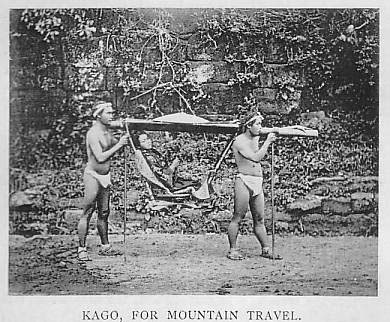
Being charged with iron and sulphate of soda, and hence serving as a specific for some stomachic disorders that are common among the upper and middle classes in Japan, the water of Ikao is much prized for its medicinal properties, which are also efficacious in certain ailments of the daughters of Eve.
But, after all, it is the bathing that chiefly attracts three-fourths of those who come here.
If you explore the little town you find an all-pervading presence of hot water.
Its steam is everywhere.
Go where you will you hear its rush and trickle, and the splashing and chatter of happy bathers immersed to their chins in a rusty fluid at the high temperature - only pleasantly warm, to a Japanese-of 117 deg. Fahrenheit.
Wooden or bamboo pipes lead it all over the place, and supply a constant stream through every bath.
Each large hotel has several such baths - roomy wooden tanks three or four feet deep.
Here the sexes bathe separately.
But in the public baths men and womem of the lower orders often bathe together, in half-open sheds at the street side, yet with a degree of modesty and decorum, and a quiet unconcern about each other's presence or the stray glances of passers-by, which are absolutely incomprehensible to those who have not witnessed the habit as still practised in a few parts of Japan.
"Cleanliness before all other things" seems, however, to be a cardinal maxim with the Japanese.
You see this in the everlasting scrubbling, pumic-stoning, and tubbing in the bath-houses, which from dawn till far into the night know hardly a moment's rest.
You see it also in the scrupulous cleanliness of their houses, and in their careful provision for light and ventilation, all of which are so grievously wanting in the unsavoury dwellings of the Flowery Land.
Here even the most crowded second-class inn, where the guests may sometimes be counted at literally one per mat of six feet by three feet, can show spotless - would that we could say flealess - floors and walls, while an abundance of air and light is obtained by the simple expedient of sliding back or removing the paper-glazed partitions at the front and rear.
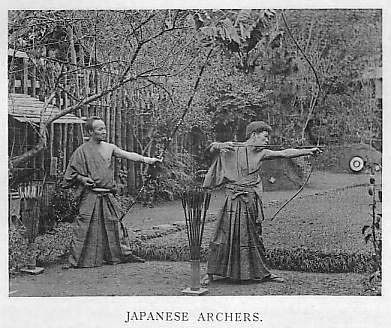 Foreign visitors to Ikao may now count on finding fairly comfortable quarters in one or two clean and cheap hotels, with bedsteads and other furniture, foreign cooking, and a tolerable menu.
With these accessories, with the luxurious baths which, when the water is a little cooled, Europeans soon learn to appreciate, with many attractions of scenery and climate, as well as a host of novelties that are to be seen nowhere but in Japan, and best of all at a Japanese spa - the man who fails to be pleased with life at Ikao can have no one but himself to blame.
Something of its chief characteristics has been told above.
But it would need columns to do more than mention the tea-houses, curio-shops, and kiosks; the story-tellers, strolling musicians, jugglers, mountebanks, and quacks; the clever old moji-yaki, who handles his hot liquid streams of sweetstuff with such persuasive skill that they are quickly fashioned, as by magic, into the most amazing baskets, tortoises, and other quaint shapes, before the very eyes of the delighted children who are his patrons; of the archery-grounds, where you can indulge in target practice with the formidable bows and arrows of old Japanese warfare; and of other novelties and diversions - all as distinctively Japanese as is the landscape itself - in which the visitor, whatever his age or country, may find simple enjoyment without stint at Ikao.
Foreign visitors to Ikao may now count on finding fairly comfortable quarters in one or two clean and cheap hotels, with bedsteads and other furniture, foreign cooking, and a tolerable menu.
With these accessories, with the luxurious baths which, when the water is a little cooled, Europeans soon learn to appreciate, with many attractions of scenery and climate, as well as a host of novelties that are to be seen nowhere but in Japan, and best of all at a Japanese spa - the man who fails to be pleased with life at Ikao can have no one but himself to blame.
Something of its chief characteristics has been told above.
But it would need columns to do more than mention the tea-houses, curio-shops, and kiosks; the story-tellers, strolling musicians, jugglers, mountebanks, and quacks; the clever old moji-yaki, who handles his hot liquid streams of sweetstuff with such persuasive skill that they are quickly fashioned, as by magic, into the most amazing baskets, tortoises, and other quaint shapes, before the very eyes of the delighted children who are his patrons; of the archery-grounds, where you can indulge in target practice with the formidable bows and arrows of old Japanese warfare; and of other novelties and diversions - all as distinctively Japanese as is the landscape itself - in which the visitor, whatever his age or country, may find simple enjoyment without stint at Ikao.
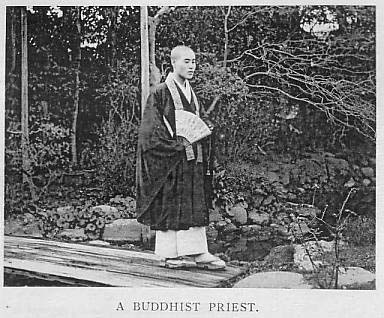 To some foreigners, enfeebled by long residence in the East, the medicinal value of the water is a great attraction, and whether he drinks the water or no what new-comer ever tires of the short walk to the Yumoto, or hot-spring's source, in the glen behind the village?
There is no "pump-room" here - only a dusky sylvan dell, a rustic bench or two, a square hole in the rock beneath which the steaming water flows, and a simple bamboo dipper for those who drink.
But the morning or evening walk thither is delightful, in the cool shade of a lovely ravine, rich with greenery, enlivened by the murmur of falling water and the shrill whirr of cicadas, and brightened by the most picturesque and happy of human throngs.
On this neutral ground you meet representatives of nearly all classes of Japanese society, from the plain shopkeeper or professional man of the capital to the blue-blooded scions of an aristocracy so ancient that no member of it begins to think his family worthy to be called an old one until he can trace a clear descent for six or seven hundred years.
There are Daimiyo of the old regime, Ministers and Secretaries of the new-possibly, also, a Prince or Princess of the Imperial family.
There are the greater and lesser nobles of the feudal era, most of them now enrolled in the lately-created peerage; and former samurai, of all degrees, who mainly compose the large official class of modern Japan.
Many are accompanied by their wives - those gentle, devoted, well bred, and essentially feminine women who brighten Japanese homes, and who, you rejoice to see, are no longer disfigured as of old by blackened teeth, but can, and do, smile on you in all their native comeliness.
The prevailing dress of both sexes, if it be morning, is the yukata, or modest cotton bathing-robe, of all hues and patterns, bound at the waist by a girdle of silk, satin, or crape.
Here, however, comes a Buddhist priest, all shaven and shorn, in his silk robe and cool mantle of delicate gauze, fanning himself with holy but needless fervour.
Next, a high Foreign Office dignitary, looking, as he well may do, a good deal bewildered about the treaties, and clad in the quiet silk and crape garments of ordinary life, with the crest of his house woven in white on the back and sleeves of the uppermost one.
Then, pehaps, you come upon a pair of young dandies, in all the pride of foreign clothes, stand-up collars, tight gloves, and dainty canes and shoes.
But they are a mistake here, where, excepting themselves and the foreign-style socks, shoes, and straw hats, now pretty common among the men, you have little or nothing to remind you that you are not in old Japan.
Next, oh happy contrast! a flutter of fans, a patchwork of vivid colours, a ripple of laughter, and you are face to face with a gay troop of Japanese Hebes, rosy-lipped and dark-eyed, with beautiful teeth, clear complexions of all shades from ivory-white to nut brown, willowy forms finely-pencilled eyebrows, and rich masses of black hair, tastefully braided and set off by some bright flower or coral ornament, with a neat binding of blue or crimson crape.
Mirth, guilelessness, and - if there be anything in physiognomy - a large capacity for love, beam from the faces of those most killing Japanese belles.
And their dresses are a study.
While Japanese parents and adult folk generally content themselves with colours of almost Quaker-like sobriety, the nation seems to have lavished a world of artistic taste and skill on the dress of its girls and children.
Be the colours bright or dull, the patterns bold or tame, the fabrics coarse or fine, the contrasts sharp or soft, you find that in artistic arrangement, grace, and beauty, the whole effect is always charming.
As for the children, they swarm, they are delightful, and they present perfect nosegays of colour.
If at first they look a little old-fashioned, in costumes which as to cut are merely reproductions in miniature of those of their parents, you soon find out that in reality they are very children.
When you know them better you also find that, with all the attractions and virtues of children, they have very few of their faults.
Long before Herbert Spencer taught the Western world how children should be reared, Japanese parents had of their own motion adopted most of the very principles of training which he inculcates.
The result is the Japanese child of today.
Great changes have passed over Japan during the last 30 years.
Great changes still lie before her.
But, come what may, let us at least hope that in disposition, manners, grace, and dress, Japanese children and young girls may remain, essentially, as they are.
To some foreigners, enfeebled by long residence in the East, the medicinal value of the water is a great attraction, and whether he drinks the water or no what new-comer ever tires of the short walk to the Yumoto, or hot-spring's source, in the glen behind the village?
There is no "pump-room" here - only a dusky sylvan dell, a rustic bench or two, a square hole in the rock beneath which the steaming water flows, and a simple bamboo dipper for those who drink.
But the morning or evening walk thither is delightful, in the cool shade of a lovely ravine, rich with greenery, enlivened by the murmur of falling water and the shrill whirr of cicadas, and brightened by the most picturesque and happy of human throngs.
On this neutral ground you meet representatives of nearly all classes of Japanese society, from the plain shopkeeper or professional man of the capital to the blue-blooded scions of an aristocracy so ancient that no member of it begins to think his family worthy to be called an old one until he can trace a clear descent for six or seven hundred years.
There are Daimiyo of the old regime, Ministers and Secretaries of the new-possibly, also, a Prince or Princess of the Imperial family.
There are the greater and lesser nobles of the feudal era, most of them now enrolled in the lately-created peerage; and former samurai, of all degrees, who mainly compose the large official class of modern Japan.
Many are accompanied by their wives - those gentle, devoted, well bred, and essentially feminine women who brighten Japanese homes, and who, you rejoice to see, are no longer disfigured as of old by blackened teeth, but can, and do, smile on you in all their native comeliness.
The prevailing dress of both sexes, if it be morning, is the yukata, or modest cotton bathing-robe, of all hues and patterns, bound at the waist by a girdle of silk, satin, or crape.
Here, however, comes a Buddhist priest, all shaven and shorn, in his silk robe and cool mantle of delicate gauze, fanning himself with holy but needless fervour.
Next, a high Foreign Office dignitary, looking, as he well may do, a good deal bewildered about the treaties, and clad in the quiet silk and crape garments of ordinary life, with the crest of his house woven in white on the back and sleeves of the uppermost one.
Then, pehaps, you come upon a pair of young dandies, in all the pride of foreign clothes, stand-up collars, tight gloves, and dainty canes and shoes.
But they are a mistake here, where, excepting themselves and the foreign-style socks, shoes, and straw hats, now pretty common among the men, you have little or nothing to remind you that you are not in old Japan.
Next, oh happy contrast! a flutter of fans, a patchwork of vivid colours, a ripple of laughter, and you are face to face with a gay troop of Japanese Hebes, rosy-lipped and dark-eyed, with beautiful teeth, clear complexions of all shades from ivory-white to nut brown, willowy forms finely-pencilled eyebrows, and rich masses of black hair, tastefully braided and set off by some bright flower or coral ornament, with a neat binding of blue or crimson crape.
Mirth, guilelessness, and - if there be anything in physiognomy - a large capacity for love, beam from the faces of those most killing Japanese belles.
And their dresses are a study.
While Japanese parents and adult folk generally content themselves with colours of almost Quaker-like sobriety, the nation seems to have lavished a world of artistic taste and skill on the dress of its girls and children.
Be the colours bright or dull, the patterns bold or tame, the fabrics coarse or fine, the contrasts sharp or soft, you find that in artistic arrangement, grace, and beauty, the whole effect is always charming.
As for the children, they swarm, they are delightful, and they present perfect nosegays of colour.
If at first they look a little old-fashioned, in costumes which as to cut are merely reproductions in miniature of those of their parents, you soon find out that in reality they are very children.
When you know them better you also find that, with all the attractions and virtues of children, they have very few of their faults.
Long before Herbert Spencer taught the Western world how children should be reared, Japanese parents had of their own motion adopted most of the very principles of training which he inculcates.
The result is the Japanese child of today.
Great changes have passed over Japan during the last 30 years.
Great changes still lie before her.
But, come what may, let us at least hope that in disposition, manners, grace, and dress, Japanese children and young girls may remain, essentially, as they are.
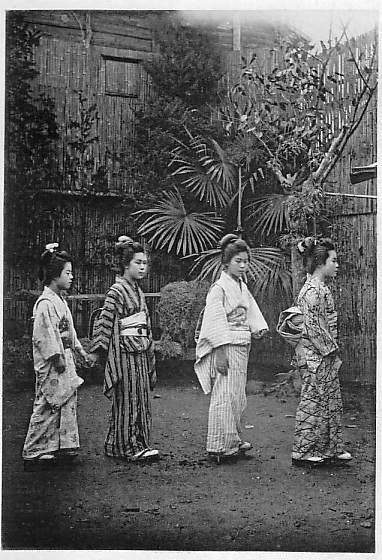
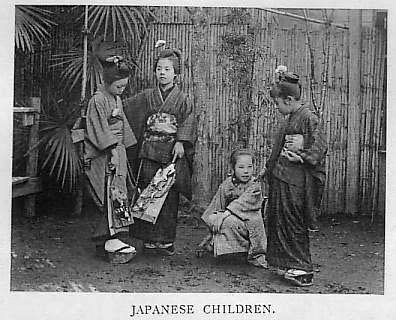
The Times-Oct.20th
Going Back to Article List
